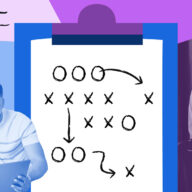To wrap up season two of Work Check, we’re bringing in a special guest judge: Atlassian’s co-founder and co-CEO Scott Farquhar. Debaters Maren Hotvedt, Kelvin Yap, and Eli Mishkin join host Christine Dela Rosa to hear Scott’s takes and reflect on the season’s debates.
Episode References
- https://www.atlassian.com/blog/podcast/work-check/season/season-2/should-you-send-that-message-in-a-dm-or-a-group-channel
- https://www.atlassian.com/blog/podcast/work-check/season/season-2/should-you-add-your-coworkers-on-social-media
- https://www.atlassian.com/blog/podcast/work-check/season/season-2/should-you-really-wear-pajamas-to-a-zoom-meeting
Transcript
Marshall Walker Lee:
Yeah, this is going to be very interesting…
Dominique Ward:
Now, is that so…
Maren Hotvedt:
But if you’re connected to your coworkers…
Kelvin Yap:
This is my first point. Come on…
Christine Dela Rosa:
I like it. I like it…
Kelvin Yap:
Right…
Christine Dela Rosa:
Interesting…
Christine Dela Rosa:
Welcome to Work Check, an original podcast from Atlassian. I’m your host, Christine Dela Rosa and today I’m joined by not two but three debaters! We have Kelvin Yap, Maren Hotvedt and Eli Mishkin.
Kelvin Yap:
Hey everyone.
Maren Hotvedt:
Hi.
Eli Mishkin:
Hey, there.
Christine Dela Rosa:
Y’all, this is our last episode of the season and we’re doing something a little different to wrap things up.
Christine Dela Rosa:
Now, during Atlassian’s Team 22 conference in Las Vegas this year, I chatted with our very own co-founder and co-CEO, Scott Farquhar. I’ve been alone in judging all the debates this season. So I wanted to hear where Scott sits on some of the topics we tackled. Like Maria says in The Sound of Music, “We started at the very beginning” on the first episode. Take a listen.
Christine Dela Rosa:
Scott, we started the season asking, is it okay to wear pajamas to a work Zoom meeting? Now, before you answer, I want to ask, have you ever worn pajamas to a Zoom meeting?
Scott Farquhar:
I really wear tracksuit pants, shorts. I don’t think I’ve put shoes on in about a year. I have Ugg boots that go on in winter, and flip flops in summer. So I reckon anything below the camera, anything out of sight is fair game to wear whatever’s comfortable.
Christine Dela Rosa:
What about on screen in frame?
Scott Farquhar:
Well, on screen I have just really gone… a black t-shirt because it’s… like I’m wearing right now. ‘Cause it’s easy. And look, I think if you turned up in your Care Bear cuddly pajama top, it might be a little bit off-putting to other people around there, unless of course you’ve all decided to wear pajamas. We have to establish new cultural norms in this world. So you know, if you’ve all decided to do it, why not?
Christine Dela Rosa:
Is there ever a line where it’s not acceptable or what you would think is inappropriate?
Scott Farquhar:
It’s interesting what’s appropriate, whether it’s in an office or whether it’s at home, I think is all defined by the team norms and what people are comfortable with. And so there’s sort of an Overton window about what is acceptable in work. And I think we’ve gotten used to the kids running in the background or coming in, or having to stop a Zoom meeting to attend to some household activity – collecting a package. Those things are now cultural norms that they weren’t previously, before the pandemic. And so I think we’ll see the Overton window change in terms of what people are comfortable wearing on screen as well.
Christine Dela Rosa:
That makes sense. The bleed between personal and work just kind of goes right into each other.
Scott Farquhar:
Look, I mean, Zoom is a new world and I’ve got my own kind of embarrassing story that involves a board meeting and a Zoom call, actually.
Christine Dela Rosa:
Please, please tell us.
Scott Farquhar:
I haven’t shared this with the people on my board. I’m sure they’ll hear about it through this podcast. But by the time presentations get to our board, I’ve vetted them three or four times. I’ve reviewed them, I’ve read them, contributed to them. So on this board meeting, we actually have pre-reading where the board will spend 15 or 20 minutes reading through the six page document that we have written for them. And in hour three or four of the board meeting, I was like, okay, I’m just going to use this opportunity to go to the bathroom whilst everyone is reading.
Scott Farquhar:
And so I just leave my laptop, but I’ve still got my Apple headphones in – my AirPods in – because if you take them out, sometimes it ends the call and so forth, and I didn’t want to end our board meeting. And so anyway, go to the bathroom, no problems. And then I flush the toilet and I just hear this sort of muted laugh, sort of nervous laughter on the phone call. And then I just hear someone say, and I remember exactly who it was on the board said,
Scott Farquhar:
“Is that… What I just… is that what I thought it is?”
Scott Farquhar:
And then you go, oh, what can I do? I can’t mute it now. I can’t get… hurry back to my desk. And so you just… Do I admit to it on the board call? And the course of action for me is I sort of slunk back to my desk, hoping that there’d be enough people on the call. And I get back to my desk and all but two or three people are on video. So clearly none of them have gone to the bathroom. And so it’s a very small list of people whom this could possibly be the case. And so I’ve had embarrassing Zoom moments.
Christine Dela Rosa:
Well, it’s public information now. But very relatable. We all have people in the background, we’re all doing other things. So as it relates to pajamas, it gives it an extra okay of like, life is happening.
Scott Farquhar:
Totally. We’ve always said that we want you to bring your whole self to work. There’s not a work person and a home person. There’s one of you. And we expect a lot from our employees and the time they spend working. And so life has to bleed in and around that. And if that is taking time off to go to a kid’s soccer game or do a passion project or go for run in the middle of the day, we’ve always encouraged that. And I think it’s just, you get more flexibility in this new world.
Christine Dela Rosa:
No, I appreciate that as an Atlassian.
Christine Dela Rosa:
So what’d you think? Is that what you thought Scott was going to say?
Eli Mishkin:
Overton window and pajamas in the same sentence. I never thought I’d live to hear that, but I’m here for it.
Maren Hotvedt:
Wait, what does that mean?
Eli Mishkin:
Overton window is basically the spectrum of societal norms. The things that we think are acceptable and how that shifts over time.
Christine Dela Rosa:
Listening to all of you is just a big Googling exercise for me in the background.
Kelvin Yap:
My question is, is it pajamas if you wear it all the time? ‘Cause I wear my sweatpants out these days, and it’s kind of become the norm for me.
Maren Hotvedt:
That was, Kelvin, that was my argument, was what is pajamas? Literally today, it’s all one and the same. It’s clothing. And especially if you can’t even see it, if you can’t tell what I have on my feet, why does it matter what I have on my feet? Right?
Kelvin Yap:
Yeah. Yeah. I have a bit of a reputation for wearing flip flops or just going barefoot in the office.
Christine Dela Rosa:
Sure do.
Kelvin Yap:
I have… I’m wearing it now. It’s like a work jacket. So I normally wear my pajamas. And when I know I have to sit in front of a camera on a Zoom meeting, I throw something kind of professional-looking on, but it’s literally what I slept in last night.
Christine Dela Rosa:
Did y’all relate to what he was talking about with bleed between the work and home self, and that there should only really be one of you?
Eli Mishkin:
Totally. Yeah. There is only one of you. I’ve got two kids at home and they always pop into my conference calls and they make themselves known. They’re actually known by many on my team as Tall One and Smaller One. So there is no divide any longer. And I think it’s probably healthier for us not to pretend that we have two different lives.
Christine Dela Rosa:
Yeah. I get that. Okay. Let’s hear a bit more from my sit down with Atlassian’s co-founder Scott Farquhar, digging into another debate from the season.
Christine Dela Rosa:
All right. I’m going to switch gears to our next question. Mid-season, we did an episode asking, should you add your coworkers on social media? I see that you follow Mike on Twitter…do you follow other coworkers online on your social media?
Scott Farquhar:
I am a terrible social media user.
Christine Dela Rosa:
Okay, should have asked that first.
Scott Farquhar:
My Facebook really consists of people that I was friends with when I started using Facebook 15 years ago. And it kind of has just been…
Christine Dela Rosa:
Frozen in time?
Scott Farquhar:
It’s totally frozen in time. And so my social media usage, I think consists of going to Twitter for outrage, to sort of see what’s happening in the world, or news. And I go to Instagram for inspiration. And so I don’t typically follow coworkers online. I found out after just thinking about this podcast and chatting with some people about whether I should, that for some of my colleagues where I have joined them online, that affects what they post on their social media. And so there’s an aspect of the boss following you that makes you just a little bit more careful about what you post.
Christine Dela Rosa:
I see. Do you consider that too in not adding folks on your social media? You want to have a separation for what people are able to express outside of work?
Scott Farquhar:
I feel like I’m doing you a favor to not follow you on social media. I think that’s probably what it comes down to it. No, I just don’t really use social media to stay in touch with people. I think there’s too much time on screens these days. I prefer to catch up with people in real life.
Christine Dela Rosa:
Gotcha. With your CEO hat off, would you recommend that other people connect and follow each other?
Scott Farquhar:
Look, I think if you were friends with someone, I don’t think it should matter whether you’re friends through work or you’re friends because you went to high school together. If you’ve got that relationship where you want to call them a friend, then I think, yeah, don’t let work come into it.
Christine Dela Rosa:
Okay. My first question for y’all. If you had the opportunity, would you connect with Scott on social?
Eli Mishkin:
I think his point about having the boss follow what you say is a really interesting one and probably would influence what I post. I’m a fairly careful social media poster to begin with. So I don’t know that it would really impact my behavior, but it would give me a second guess for accepting that friend request.
Christine Dela Rosa:
But you would, right?
Eli Mishkin:
I think so. It’s pretty rude to not accept the boss’s request, right?
Kelvin Yap:
That’s fair.
Eli Mishkin:
I’ve got kind of a spicy angle. I think with remote work, work itself has become more social media-fied. And so every day kind of feels like some sort of involvement on a social media platform or at least social media behavior, emojis and commenting nonstop. So at the end of the day, I’m kind of done with that. I don’t know if I need anymore, whether it’s with colleagues or not.
Christine Dela Rosa:
Sure. I mean, Maren, I know from this debate, you’re kind of against adding coworkers on social, right?
Maren Hotvedt:
Yeah…Kind of. So I argued against connecting with your coworkers on social media, but I’m going to be honest. I totally agree with Scott’s rationale. If you are friends, I honestly don’t let it affect whether or not I add somebody. So, true hypocrite – I’ll confess, I’m connected to Kelvin on social media, and he’s my coworker. So clearly I don’t really follow these rules that I’ve set out. But I think inherently, I have this rule in my head where if I haven’t actually met the person in-person… like my closest coworker right now, I met a couple years ago. She joined my team mid-pandemic. We talk every day, all day, and I’m not connected to her. And so it’s this weird thing of like, if we had opportunities to work in-person, I totally think we would be. But I just feel weird, frankly, connecting with people in these current circumstances, we just haven’t had that opportunity to have that personal relationship build.
Kelvin Yap:
I find that fascinating because some of my best friends I’ve met through work. You spend so much time with them day in, day out that it’s hard for you not to be friends with them socially as well. So I don’t really have that rule. And if anything kind of to Maren’s point, I lean into social media a little bit more now that we only do see them on Zoom, because I do feel like I get a better understanding about who they are and maybe how they work based off who they are on social media.
Christine Dela Rosa:
Okay. Well, on that note, let’s hear from Scott on the final debate of our season.
Christine Dela Rosa:
We ended the season on a debate about communication and collaboration on platforms like Slack. So we asked, should your team default to communication in open channels, meaning not DMs or one-on-one messages. And so to start, I want to ask what’s your personal default for online chatting?
Scott Farquhar:
A couple things on this. One is I really think that overuse of Slack or Teams or these types of products is a bit of an anti-pattern. And so my status says, email me if it’s not urgent, because I can forward an email, I can archive it, I can set up mail rules. I can do a lot of things that I can’t necessarily do in these types of chat tools.
Scott Farquhar:
That said, when I’m working with people across the organization, I’ll often create a channel with someone and their boss so that if I’m asking someone to do something that their boss also finds out about it. I have channels for our exec team and other areas. And so I feel like if you are going to converse with, I don’t know, 20 or 30% of the team, then it’s worthwhile putting it in a shared channel for shared context because it may not be relevant to that person right now, but like their teams or what they’re trying to do, it is relevant. So I’m probably more on the shared channel side of things, but not for everything. I think there’s got to be a little bit of a threshold before you would want to do that.
Christine Dela Rosa:
When it comes to the line of when it is okay for sharing in an open channel, what are some of the reasons why you might want to connect with teammates there?
Scott Farquhar:
I think a lot of teamwork is sharing context between people, and essentially what a lot of our products do is help get information out of someone’s head into someone else’s head. And you can’t have teamwork without a shared context between you. And I think a lot about how do we get the right information to the right person at the right time. And one of the things that we built at Atlassian is we build products like Confluence and where Confluence is a product that is a shared brain or memory for the organization where people can find stuff that happened five years ago, or 10 years ago.
Christine Dela Rosa:
Yeah. It’s the institutional knowledge.
Scott Farquhar:
It totally is. If you join Atlassian, you could spend the first three weeks just reading all the old blog posts and all the old stuff that’s happened. And I don’t think there’s a right or wrong there, but you want to share as much context as you can with people that have to be involved. But on the flip side, if you don’t need to find something out and it’s a waste of time, you could be doing something else with that time.
Christine Dela Rosa:
Eli, Kelvin, I know that you both argued on this specific topic. Did what Scott say affect how you felt about your arguments from the episode?
Kelvin Yap:
I just want to remind Eli that there is actually a right or wrong in terms of debates, and I’m pretty sure I was right. And you were wrong. So I just want to put that out there and put it aside.
Eli Mishkin:
I do believe I heard Scott say there is no right or wrong, but no, go ahead. You go against Scott. That’s fine.
Kelvin Yap:
I will say the context that I will throw out there is Scott is the co-CEO and co-founder of a very large organization. And I completely understand where he would get overwhelmed with a lot of the communication that would come his way. But I think in general, he is correct. I think it’s great to default to open, and choose the time and the place to go DMs when necessary.
Eli Mishkin:
It’s really interesting listening to how Scott thinks of communication in those channels. I argued against defaulting to open channels because it creates a cognition burden to need to keep up. And so I think what landed most with me about what Scott was saying is the intentionality of sharing is really important. And I think when you default to something you’re actually defaulting right past intention.
Christine Dela Rosa:
Maren, as someone that wasn’t in that debate. What are you thinking?
Maren Hotvedt:
Sorry, Kelvin. I couldn’t agree more with Eli.
Kelvin Yap:
Unfollowing you from social media right now.
Maren Hotvedt:
All right. Yeah, that’s fine. Yeah. It’s really interesting. I kind of agree with Eli. I am in a heck of a lot of Slack channels and just personally, I feel such a cognitive burden from seeing so many messages that frankly are not relevant to me. And a lot of the time they still stress me out, right? Cause I’m just like, do I need to care about that? Do I not need to care about that? And I go through this sort of mental calculus and eventually I get so many that I’m like, okay, goodbye, never mind. And in fact, I have this time period every morning that I call my triage time, where I’m triaging emails and Slacks just to get rid of the stuff that I don’t need. And I think a lot of people do this.
Christine Dela Rosa:
No, I do it too.
Maren Hotvedt:
And so to me that kind of hints at, in general, there’s probably too much sharing going on or not sharing necessarily to the relevant parties or having the right people in Slack channels. But I think Eli really hit the nail on the head with, if you think intentionally before sending it, who needs to see this, what is the appropriate way to send it? Then that’s perhaps kind of a way forward that reduces some of that cognitive overload and just being in frankly, too many Slack channels that are all very noisy.
Eli Mishkin:
Couldn’t have said it better myself.
Kelvin Yap:
I am clearly in the minority here, but I will say that I think, the way I view it is what is convenient for me versus what is better for us. And there is a convenience factor of blocking out a lot of that noise, but we do miss out on that opportunity of the shared context and understanding that Scott alludes to that really helps us work better together in the long run. There’s no silver bullet here, but I clearly err on the side of the pros of sharing things openly first.
Christine Dela Rosa:
I mean, despite that Kelvin, it sounds like all of us are pro figure out what the right intention is. Figure out what’s right in each situation. So we’re kind of all together on this. Everyone’s a winner.
Kelvin Yap:
I won the debate though, just to be clear.
Christine Dela Rosa:
Yes, Kelvin.
Christine Dela Rosa:
Like I mentioned, this bonus episode comes at the end of our second season, but since we’re always looking for future topics, I wanted to get some new ideas. And so I posed that challenge to Scott.
Christine Dela Rosa:
What kind of questions do you have about whether or not a certain practice or way of working should be evolved? I’m wondering if you have any suggestions for episode topics for the next season.
Scott Farquhar:
I think where in your life and world is it appropriate to take work meetings? You know, should you do it at the cafe? Can you do it outside? Do you have to do it inside with a good microphone? Can you be sitting at the beach? And the waves crashing in the background whilst you are dialed into your Zoom call? Where is appropriate?
Christine Dela Rosa:
Is that your answer? If you can answer that question.
Scott Farquhar:
I want to hear what other people have to say. I don’t want to prejudice people. Don’t ask me these questions and then ask me the answer.
Christine Dela Rosa:
So, where to take your work meetings. That’s not something I think about too often. What do y’all think about that?
Eli Mishkin:
That’s sort of the real world equivalent of what’s on your feet, right? What’s behind you? What’s the ambience and the environment?
Kelvin Yap:
On my feet? Currently nothing.
Kelvin Yap:
I would say it depends, but that’s not really an answer. I’d say you have to be careful about where you take your calls. I think ultimately there is a time and place to have a meeting on a beach, sipping a cocktail or something like that. I don’t think that’s going to happen all the time from “I’m distracted” all the way through to “what kind of image does this bring across while I’m having this meeting with the other people who might be in an office” or something like that, right. If it’s something very important, does taking a meeting at a beach kind of give off the idea that you feel like “Whatever, I don’t really care because I’m on the beach relaxing right now?”
Eli Mishkin:
I think Kelvin’s right. There’s also this sense that are you your best self? Are you showing up in a way that you can present and participate in the way that you would hope other people would? So would you show up to a big executive presentation on the beach without shoes?
Christine Dela Rosa:
Kelvin.
Eli Mishkin:
Looking at you, Kelvin.
Kelvin Yap:
Yes. Yes.
Christine Dela Rosa:
Maren, what do you think is acceptable for where you take meetings?
Maren Hotvedt:
I think it’s so contextual. It really depends on the meeting. Do you need to take notes? Do you need to screen share and have a big monitor? The reality is that you’re going to need to be at a desk for that. It’s a lot of my work. But then on the flip side, I was just thinking, I had a meeting last night that was a metrics readout and all they were doing was talking through numbers and charts. And I was just a listener. And it was at 7:00 at night, which is when I need to walk my dog. So I listened to it while walking my dog. I don’t take 99.9% of my meetings that way. But for this one, it was like, no, that actually makes a ton of sense. And honestly not seeing things kind of helped me absorb better because I was really listening.
Kelvin Yap:
Yeah, I agree. I definitely have my fair share of one-on-ones on walks. I think it kills two birds with one stone. You get some fresh air and you get to have a great conversation with them versus being distracted in front of your computer.
Eli Mishkin:
Feel a wind between your toes, so to speak.
Kelvin Yap:
Exactly. Exactly.
Maren Hotvedt:
Well played.
Eli Mishkin:
The other thing I think is interesting – the Overton window has been mentioned. Can we create an Overton window of Zoom calls in the invite? Can we actually put, is this a call that you can take off screen? Can you walk around with this call? And it won’t impact anybody. As the presenter, can you let other people know how you expect them to show up? I think that’d be really nice to have some ground rules and expectations about how folks should engage on a call.
Kelvin Yap:
I love that.
Maren Hotvedt:
I like that.
Christine Dela Rosa:
I think that there’s a lot of context sharing like that for if you’re on a video chat, some people will put in their user names, not just their name, but where they’re calling from or their functional role or title. And sometimes in chat platforms you can put preferred pronouns and you’ve got a profile picture. And I think all of this context is just so helpful. So I’m all about that, Eli.
Christine Dela Rosa:
Okay. We had a lot of fun this season digging into topics and debating how our work lives could or should improve. So I wanted to give Scott the last word on why we should think deeply about the ways we work.
Scott Farquhar:
That’s hugely important. At Atlassian, we try to be an exemplar in this. And I feel like we have a sort of responsibility to be constantly experimenting with how we all work. And if you say, go to Dan Pink, one of the things he talks about is every employee wants mastery, autonomy, and purpose. And those three things are huge motivators for people. And so I think autonomy is very, very important because everyone wants to just set up their own work environments, the way they work, the times they work. So I think people need autonomy to work differently. And if everyone does that, but there’s no alignment at all, it’s just total chaos because people don’t get stuff done. It’s people singing out of harmony. You still want a band. You want everyone to play their own instrument. But if people do it in very, very different ways and aren’t in any sort of harmony, that becomes a problem. And so we are thinking about how we get our teams to work differently, but do it together.
Christine Dela Rosa:
Yeah. I love that. How you work really changes the way that your work outcomes are, but you can’t just do that in a vacuum and think about yourself. You have to do it in tandem with everyone else’s changes.
Scott Farquhar:
Totally.
Christine Dela Rosa:
Any recent examples of how you’ve personally changed the way you work or perhaps any ways that you want to change the work that you haven’t quite been able to figure out yet?
Scott Farquhar:
Just when I work has been important for me. And I’ve got three young boys, they go to school and they all actually have different drop offs and pickup times in the morning, afternoon. And to be able to organize my day to drop them off a couple times a week, or to be there when they come home in the afternoon and just spend some time with them, maybe throw a basketball around for 20 minutes before I get back to work. That’s been really important as well.
Christine Dela Rosa:
Awesome.
Christine Dela Rosa:
Does what Scott said resonate with you?
Maren Hotvedt:
I think it’s very sensible. I think that the overarching theme I’ve heard among the episodes I’ve been able to listen to is people tend to think initially – and definitely myself – about, well, how do I feel about this? But what we’ve come to realize through each of these episodes is that there’s also this broader, well, how does this affect those around me? I think that’s just been kind of time and time again, the nut of a lot of these arguments. And I think that’s really what he’s saying too, is like he’s invested in thinking about his own experience, but also cognizant of how what he does affects others. And that really just seems to sum up the season.
Kelvin Yap:
Yeah. I agree. And I would say that what I’ve taken away from listening in and participating in a lot of these debates is this idea that our working situation is always changing, whether it’s at work or it’s external forces. And the status quo that worked yesterday, isn’t going to work today. And we should always be embarking on this process of improving because our situation is always changing.
Eli Mishkin:
Well said. I really loved how Scott gave the metaphor of music as how we work is a sort of music. And as a musician, of course, that lands with me. But there is real time adaptation that you have to do as a musician. You’re listening, you’re adapting, you’re always playing with each other, but you’re also focused on your own craft. And so it’s the balance of the two, your own craft and working in concert with others. And so that’s why there will always be room to improve, always new roads to pave. And I’ll maybe shove a third metaphor in here too new space to explore, I don’t know.
Kelvin Yap:
Yeah.
Christine Dela Rosa:
On brand.
Eli Mishkin:
On brand.
Christine Dela Rosa:
All right. That is it for our second season. Thank you. Kelvin, Eli and Maren for joining me today to hear from Scott and reflect back on our debates.
Kelvin Yap:
Thanks for having me.
Eli Mishkin:
Thanks so much.
Maren Hotvedt:
Yeah, this was great.
Christine Dela Rosa:
I also want to take a second to say thank you to everyone who made this season possible. Our wonderful debaters of course: Maren Hotvedt, Dominique Ward, Marshall Walker Lee, Eli Mishkin, Rani Shah, and Kelvin Yap. Artwork by Joey Sabio and Deborah Lao. Story support from Melanie Duong and Vivian Chau and website support from Jamey Austin. Work Check is produced by the team at Pacific Content, including Pippa Johnstone, Annie Rueter and Karen Burgess, with sound design by Robyn Edgar.
Christine Dela Rosa:
Until we’re back next season, I’m Christine Dela Rosa, and this is Work Check, an original podcast from Atlassian.









































